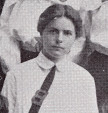As yet but knocke, breathe, shine, and seeke to mend;
That I may rise, and stand, o'erthrow mee,'and bend
Your force, to breake, blowe, burn and make me new.
I, like an usurpt towne, to'another due, 5
Labour to'admit you, but Oh, to no end,
Reason your viceroy in mee, mee should defend,
But is captiv'd, and proves weake or untrue.
Yet dearely'I love you,'and would be loved faine,
But am betroth'd unto your enemie: 10
Divorce mee,'untie, or breake that knot againe;
Take mee to you, imprison mee, for I
Except you'enthrall mee, never shall be free,
Nor ever chast, except you ravish mee.
Today is the feast day of John Donne, priest. I have always felt an affinity to Donne. For him, belief is a turbulent, violent maelstrom. Whether tumbling into lustful union with his mistress, or wrestling with his faith, his is, as he puts it, a "holy discontent."
The first poem I remember reading of Donne is his "Song"--
| GOE, and catche a falling starre, | |
| Get with child a mandrake roote, | |
| Tell me, where all past yeares are, | |
| Or who cleft the Divels foot, | |
| Teach me to heare Mermaides singing, | 5 |
| Or to keep off envies stinging, | |
| And finde | |
| What winde | |
| Serves to advance an honest minde. | |
| | |
| If thou beest borne to strange sights, | 10 |
| Things invisible to see, | |
| Ride ten thousand daies and nights, | |
| Till age snow white haires on thee, | |
| Thou, when thou retorn'st, wilt tell mee | |
| All strange wonders that befell thee, | 15 |
| And sweare | |
| No where | |
| Lives a woman true, and faire. | |
| | |
| If thou findst one, let mee know, | |
| Such a Pilgrimage were sweet; | 20 |
| Yet doe not, I would not goe, | |
| Though at next doore wee might meet, | |
| Though shee were true, when you met her, | |
| And last, till you write your letter, | |
| Yet shee | 25 |
| Will bee | |
| False, ere I come, to two, or three. |
The magic of the strange orthography, the world-weariness of the adynaton, the fantastical mandrake root, whose screams as it is pulled from the ground induces madness--all of this was heady stuff for a girl given to the romantic, who desperately wished for "strange sights, things invisible to see."
I bought a second-hand copy of The Complete Poems and committed several to memory, including The Message, with its lyrical,
| SEND home my long strayd eyes to mee, | |
| Which (Oh) too long have dwelt on thee; |
| SWEETEST love, I do not goe, | |
| For wearinesse of thee, | |
| Nor in hope the world can show | |
| A fitter Love for mee; | |
| But since that I | 5 |
| Must dye at last, 'tis best, | |
| To use my selfe in jest | |
| Thus by fain'd deaths to dye; | |
| | |
| Yesternight the Sunne went hence, | |
| And yet is here to day, | 10 |
| He hath no desire nor sense, | |
| Nor halfe so short a way: | |
| Then feare not mee, | |
| But beleeve that I shall make | |
| Speedier journeyes, since I take | 15 |
| More wings and spurres then hee. | |
| |
Recently I queried my university students as to how many of them knew a poem by heart. Not songs, but poems. Out of a class of fifty, only three hands went up. The text-message generation has no time for memorization, no desire--no need, with Google so close to hand. Rote memorization is a task archaic and useless.
But a poem memorized travels with you. I learned by heart Frost's Stopping by woods on a snowy evening in third grade for a Christmas pageant. I still can recite every word, decades hence. Last winter when a small group of us gathered over a cup of Christmas cheer, we decided to offer a spontaneous recitation--each one performed a poem standing before the mantelpiece of a roaring fire. (It was really good Christmas cheer!)
I haven't memorized any poetry lately So my goal this year is to memorize a poem a week to memory. I think I will pick some old favorites that I haven't yet memorized, and some that are new--well not really new, because for me modern poetry "does not thrill. It produces absolutely no vibrations." By a year's time, I will have 52 poems committed to memory. I would enjoy learning what poems you have memorized and what poems you recommend.
It's a Donne deal.


